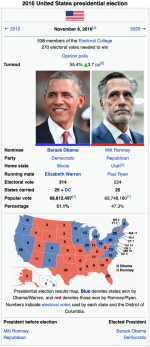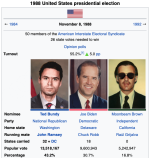The
2020 United States presidential election was the 59th quadrennial and 60th general presidential election, held on November 3, 2020. The Republican ticket of Ohio Governor Clancy Brown and former New York City Mayor Eric Adams defeated the Democratic ticket of Illinois Senator Laura Dern and former DNC Chair James Zogby.
Incumbent President Catherine Hanaway of the Republican Party declined to run for a third consecutive term, largely due to her unpopularity. As such, the Republican nomination was freely contested by numerous candidates. Vice President Eddie Abraham was considered the frontrunner and led most polls prior to 2020. However, due to his support among party delegates, he did not prepare for a serious primary campaign and was taken aback by the well funded and organized campaign of Ohio Governor Clancy Brown. Brown, a former congressman, son and grandson of congressmen, was a nationally popular figure among voters of both major parties as well as other groups. He had previously declined to run in 2008 and 2012, and was expected to do so again in 2020. He was persuaded to run after being recruited by a coalition of businessmen collectively known as "the Juniors" (Howard Hughes III, Fred Trump Jr., Jon Huntsman Jr., John Paul Getty III), who were concerned about Abraham's ability to lead during any potential military conflicts that were on the horizon. With their backing, Brown entered the contest and was enthusiastically received as he barnstormed across the country, winning the majority of the primary elections with his oratory and firm rhetoric in favor of "peace at all costs, but victory by any means." Despite Brown's popularity, Abraham retained the support of most party delegates largely due to the president's maneuvering and Brown had to bring the fight to the convention. The Vice President won the first four ballots, but Brown took the lead on the fifth, and after offering the vice presidency to Eric Adams, the leader of the New York delegation and a major leader among black Republicans, Brown won a majority on the eleventh ballot and therefore the nomination. Coming out of the convention, Brown was the first Republican to lead a presidential poll since 2014.
In contrast to the divided Republican nomination process, the Democratic Party had a fairly uneventful primary and convention. Illinois Senator and former Cabinet Secretary Laura Dern had long been favored for the nomination. After suffering two consecutive upset losses in 2012 and 2016, Democratic voters and party officials were ready to nominate one of their most popular and able candidates. Dern cleared the primary process without strong opposition, gained the support of the unions, and focused on laying the groundwork for a national campaign. She selected as her running mate former Congressman, White House staffer, and DNC Chair James Zogby. If elected, Zogby would have been the second consecutive Lebanese-American vice president. Indeed, the Dern campaign had largely been preparing to run against Abraham and were put on the backfoot by Brown's victory at the convention. Brown's popularity across demographics gave him a major advantage and his status as an outsider separated him from the unpopularity of the current administration.
Whereas the previous two elections had been dominated by the 2010s recession, the downturn from 2012 to 2018 had finally given way to a new period of growth. Banking regulations passed by Democrats in Congress over presidential veto restored consumer faith, inflation decreased, and energy tensions were eased by increased oil distribution from the Near East as well as the completion of all remaining Phase VII Nuclear Stations. However, economic recovery was unevenly spread by region and demographics. The manufacturing and construction sectors in particular had not bounced back as much as expected, and both campaigns presented plans to spur growth.
Debate over economic projects were soon overshadowed by news that Egypt and Korea both successfully tested nuclear weapons, pushing the number of nuclear powers over a dozen and greatly increasing tensions across Asia. Korea in particular now had leverage against both of its neighbors, China and Japan, who seemed closer to war than ever before. The two great powers responded to the Korean test by test firing missiles over the Pacific Ocean, with the Chinese in the area of the Philippines and Japan near Guam. The Japanese also began naval activity near the Chinese island of Taiwan. Both sides accused the other of arming Korea. In the United States, the presidential candidates were bombarded with questions of whether they would get involved in any Asian war, whether to protect American economic interests, or to support either side, both of which had close relations with the U.S. There was also considerable controversy over rumors of American assistance to the Egyptian and Korean nuclear programs, which would not be answered until after the election. Furthermore, a question which had not been discussed seriously since the revelation of American atomic weapons decades ago returned: would the new president utilize these weapons in war and become the first to do so? Dern was firm in her commitment to peace and non-usage, while Brown maintained that all options were on the table. The public was split on the issue, and research has been inconclusive as to what degree the candidates responses impacted voters.
On Election Day, Brown won core Republican regions in the South and Southwest, and Dern won the Northeast and Plains. Although Dern won swing states such as Florida, Kentucky, and Missouri, Brown won every other swing state, including Wisconsin, California, and Oregon, as well as his home state of Ohio. He also narrowly won the traditionally Democratic states of Pennsylvania and Michigan. Dern became the first nominee of either party to win Missouri but lose the election since 1900. She also received highest raw vote total of any losing candidate in history up to that point. Fourteen states were won by either candidate by margins less than 3%, making this one of the closest elections in history. Ten states flipped their results from 2016. Brown's winning coalition relied on swinging high education middle and upper class white voters, a demographic that had been key to President Hanaway's two victories as well. Brown also won the Republican Party's traditional base of southern rural and midwestern white voters. Although Brown won the national popular vote by less than half a percent and 700,000 votes, he won 53% of the electoral vote. In such a close election, any number of factors may have been critical to the outcome. Dern supporters criticized unfavorable media coverage, while Democratic Party officials sought to blame candidate quality. The infamous "President Brown" ad of old footage of Dern praising the previous president Brown is also talked about by historians, as well as economic recovery under a Republican presidency, local concerns, and "upballot" trends from Congressional races.
Brown became the fourth consecutive governor elected president and ninth Ohioan. He was the second Ohioan governor named Brown elected president. With Brown's victory, the Republican Party won a third consecutive term in the White House, leading many to predict another era of single party domination like the 1980s for Republicans and 1990s-2000s for Democrats. However, Brown lost re-election in 2024 after becoming the first wartime president since Nelson Rockefeller.








